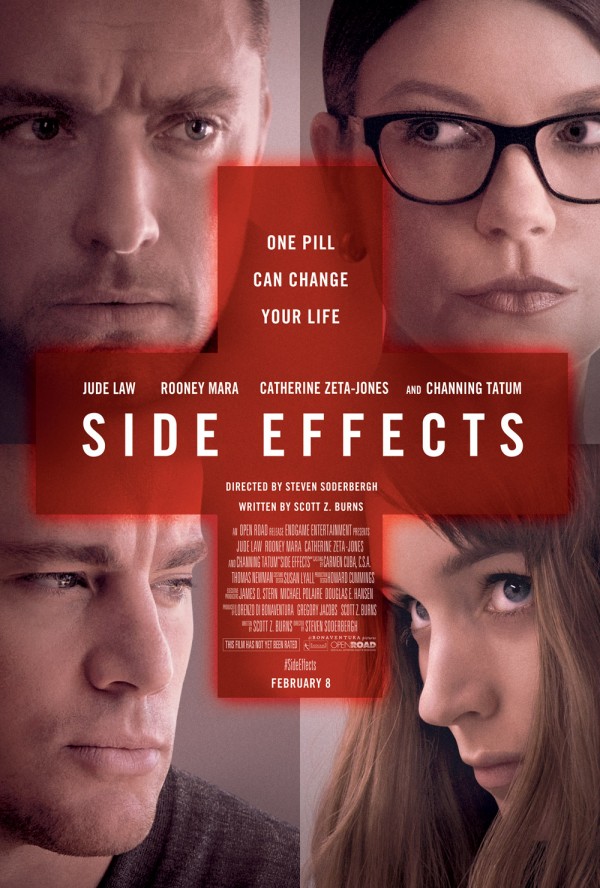SIDE EFFECTS (2013, directed by Steven Soderbergh, 106 minutes, U.S.)
 BY DAN BUSKIRK FILM CRITIC One of our most frustrating filmmakers, Steven Soderbergh returns with another distressingly confounding work. With Side Effects he sends a medicated heroine into exciting unmined territory, and in a change of tone as scattershot as any Tyler Perry movie, he steers the film directly into a typhoon of ludicrous of Hollywood thriller cliches.
BY DAN BUSKIRK FILM CRITIC One of our most frustrating filmmakers, Steven Soderbergh returns with another distressingly confounding work. With Side Effects he sends a medicated heroine into exciting unmined territory, and in a change of tone as scattershot as any Tyler Perry movie, he steers the film directly into a typhoon of ludicrous of Hollywood thriller cliches.
With great filmmakers, even their misfires can be seen as understandable consequences of an intelligent risk that didn’t pay off. While Soderbergh’s best work (and I’d single out recent works like his sly The Informant, and the whimsical Magic Mike) crackles with a knowing intelligence, his least-effective films too often hinge on a strategy that seems entirely nonsensical. “You want to make an epic about Che Guevara but leave out the politics and focus on military gamesmanship? You want to make a stringently old-fashioned black and white war movie, but fill it full of modern cursing? What? Why?”
Side Effects’ problems stem directly from the script by Contagion‘s Scott Z. Burns, although the premise he sets up is especially rich and relevant to our times. Emily (Rooney Mara) is the sensitive young wife of Martin (Channing Tatum), a former Wall Street trader just back from prison, where he served time for insider trading. Martin is an assertive business type and you can feel his sweaty anxiousness when he tells Emily, “I’m gonna get it all back,” a promise to return them to wealth with his high-risk/high-profit ways. But all this stress is taking a toll Emily, who begins acting out on her suicidal impulses. She comes under the care of the handsome Dr. Jonathan Banks (Jude Law) who prescribes the psychotropic pharmaceutical “Ablixa.” Tragedy finally strikes Emily’s world, and in the press frenzy that follows, serious questions are directed at Dr. Banks and his economic relationship with Ablixa’s manufacturer.
Shot in the same grays and blues that TV commercials use to portray depression in their advertisements, the first section of the film is a fantastic mix of social issue drama (recalling a Soderbergh highpoint, Erin Brockovich) and character study as Rooney Mara displays the deep well of vulnerability and intensity she demonstrated in David Fincher’s The Girl With the Dragon Tattoo. Reminiscent of Todd Haynes’ dreamy nightmare Safe, the overcast atmosphere of Side Effects places us deeply into the disturbed consciousness of our heroine, a woman whose sleepy eyed beauty can’t help but attract us despite the unpredictability of her mental state. Soderbergh’s examination of Dr. Banks’ monetary relationship with the makers of the drug he dispenses takes the film into an unsavory reality of modern American medicine, an uncomfortable and widespread situation that defies easy answers. Through Mara’s deeply-felt performance, the pharmaceutical industry’s irresponsibility is given an all-too human face.
I had great curiosity to see how Side Effects was going to resolve these politically troubling issues, which make the film’s mid-movie shift all the more disappointing. It’s here that Soderbergh drops the character study of Emily, drops the politically dicey examination of drug companies and instead puts Dr. Baker at the film’s center, making him a Hitchcockian “Wrong Man.” Drawing national news coverage, Dr Baker’s medical ethics are being called into question, buoyed by accusations from the Emily and her new doctor (the arch-browed Catherine Zeta-Jones). Well, “Hitchcockian” is more than a bit too generous, the story now more closely resembles a well-cast episode of Law & Order, taking a page from the headlines and building an improbably melodramtic conspiracy around its details. Mid-film re-direction isn’t necessarily a bad thing (back to Hitchcock, think of Marion Crane’s brilliantly unexpected exit in Psycho) but Side Effects game-changer doesn’t deepen the issues of the first half, it instead nullifies them. Where the beginning builds us up for a tale of how corporate greed, mixed with a doctor’s paternal authority could destroy a woman’s life, we’re then asked to change our concerns to an unfairly beleaguered Doctor being bedeviled by a scheming vixen. It’s an exchange for the thought-provoking for the formulaic, a trick that would seem beneath such a thoughtful artist as Soderbergh.
But it does point to on-going syndrome that continues to attack Soderbergh’s work, like a stubborn, seasonally-oblivious cold that keeps coming back, a sense that the director is bored and passionless about the action in front of him, like James Spader watching those videos in Sex, Lies & Videotape. Soderbergh himself has admitted frustration with the form of filmmaking, even half-believably announcing Side Effects as his last theatrical work, proclaiming that painting is his new passion. While it may seem unlikely that this is the end, let it be shown that even with two stories, the director couldn’t sustain his interest long enough to bring either of them to a satisfyingly thoughtful conclusion.

